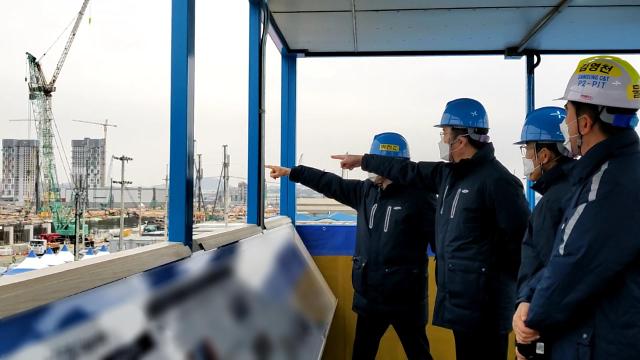Ministry of Trade, Industry and Energy launches public-private consultative body on the 4th… Utilization of domestic foundries and fabless
“Samsung, in order to become self-sufficient in automobile semiconductors, it is efficient to acquire existing companies instead of newly established”
As the problem of the supply shortage of automotive semiconductors intensified around the world, the public and private sectors have jointly prepared countermeasures in Korea. Among these, the industry is drawing attention whether Samsung Electronics will increase its competitiveness through large-scale mergers and acquisitions as the number one company in the industry.
The Ministry of Trade, Industry and Energy held an inauguration ceremony for the’Future Vehicle-Semiconductor Solidarity and Cooperation Council’ with semiconductor companies (foundry, fabless, etc.) such as Hyundai Motor Company, Samsung Electronics, and DB Hitech at the Korean Chamber of Commerce and Industry on the afternoon of the 4th to cooperate between domestic automobile and semiconductor companies. Discussed the plan.

Establishment of’Future Vehicle-Semiconductor Solidarity Cooperation Council’ 2021.3.4 [연합뉴스]
This conference is due to the fact that the global automotive semiconductor shortage has intensified since the end of last year as demand for finished cars, which had plunged due to the Corona 19 pandemic in the first half of last year, surged in the second half of last year. Domestic automakers such as Hyundai Motor Company are not experiencing a major crisis thanks to stockpiled stocks, but if supply shortages continue, there is a growing sense of crisis that Korea cannot be relieved in the second half of this year.
“The global automotive semiconductor supply and demand uncertainty is caused by the global semiconductor supply and demand mismatch, and it is difficult to fundamentally solve this crisis in a short period of time.” I will use it.”
In the short term, the government plans to support rapid customs clearance for imports and rapid performance evaluation of domestic semiconductor manufacturers, and promote self-sufficiency of automotive semiconductors and parts in the mid to long term. To this end, it plans to discover and support a cooperation model linked by automobile-semiconductor companies.
However, this shortage phenomenon is occurring in the entire global market, and the problem is that Korean companies are also heavily dependent on foreign countries. In fact, it is said that Hyundai Motor Company is also highly dependent on vehicle semiconductors abroad. Currently, the global automotive semiconductor market is dominated by NXP in the Netherlands, Infineon in Germany, and Renesas in Japan, each producing 30% of the total automotive semiconductors with a market share of around 10%.

Samsung Electronics Vice Chairman Lee Jae-yong (second from left) is inspecting the construction site of the 3rd semiconductor plant in Pyeongtaek, Gyeonggi Province. Photo = courtesy of Samsung Electronics]
In particular, vehicle semiconductors, unlike smartphones and PCs, require a relatively high level of quality and reliability requirements compared to the relatively need for’small quantity and variety’ products, so it is necessary to prepare for a strict production process. In the case of a vehicle microcontroller (MCU), which has recently caused a shortage crisis, it takes at least 6 months to prepare for production. Experts analyze that it will take at least one year to prepare high value-added system semiconductors for autonomous driving or electric vehicles in the future.
In the end, it is pointed out that in order to promote the self-sufficiency of automotive semiconductors, drastic M&A investment by domestic semiconductor companies is urgent. Since Samsung Electronics, the world’s No. 1 memory semiconductor segment, is also a latecomer in this market, belated facility investment can rather burden growth. In particular, if automobiles are recalled with more than one part, the cost burden is considerable. When it is said that it is a large car accident, it will block the recall cost and the road to receiving additional orders due to damage to reputation. Accordingly, it is expected that both inside and outside the industry will use the funds that Samsung Electronics has accumulated so far to engage in mergers and acquisitions (M&A) in the automotive semiconductor field.
The leading candidate is the Netherlands NXP. In the industry, it has been steadily raised that Samsung Electronics is considering acquiring NXP. In the investment banking (IB) industry, it has been heard that in 2019, Samsung has already conducted due diligence on NXP and TI business sites. However, Samsung Electronics is in the position that it has been reviewing multiple companies for a long time. The ambush is in the absence of the total number. It is unclear how fast decisions will be made in a situation where Vice Chairman Lee Jae-yong’s activities are not free. An industry insider said, “The reason that Samsung and others have been passive in producing vehicle semiconductors is due to profitability, and there is a market outlook that the price of semiconductors per unit will exceed USD 1,000 when the popularization of electric and self-driving cars in the future comes out.” Under the circumstances, it will be an effective investment to acquire an existing company that has been verified by Samsung Electronics.”
©’Five-language global economic newspaper’ Ajou Economics. Prohibition of unauthorized reproduction and redistribution
